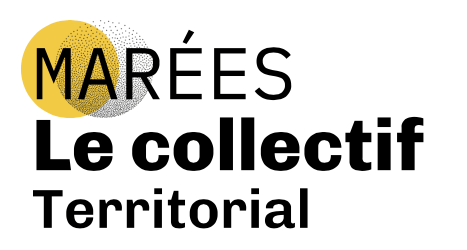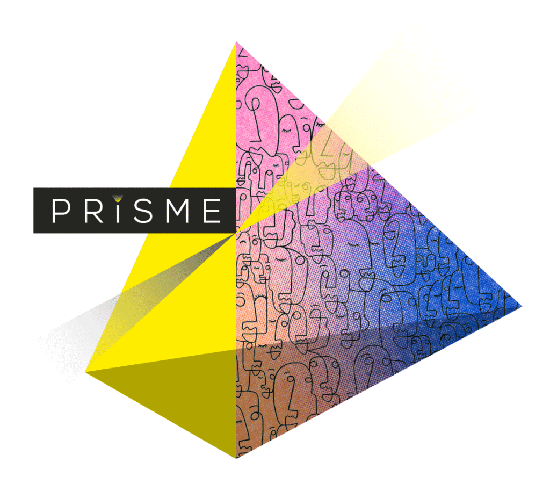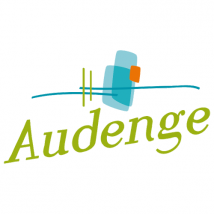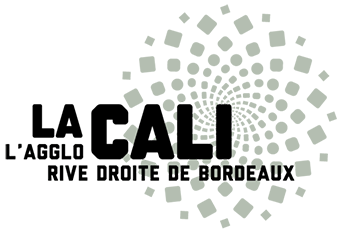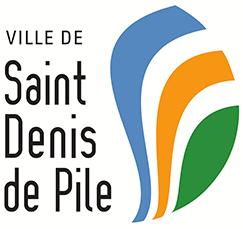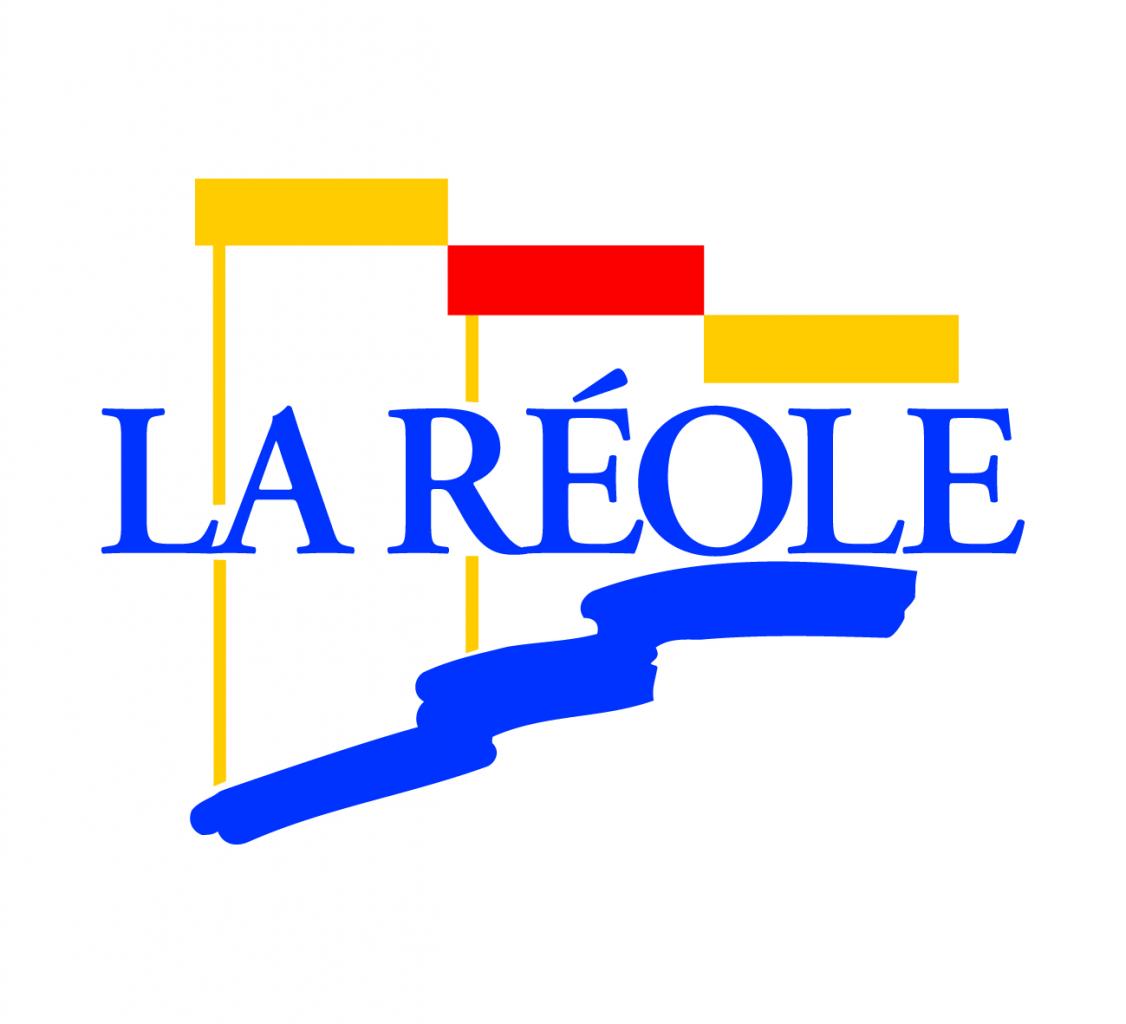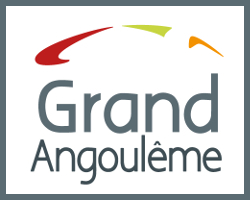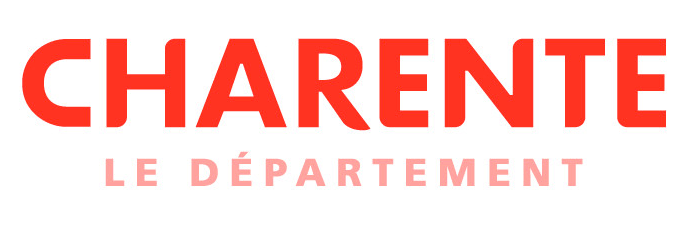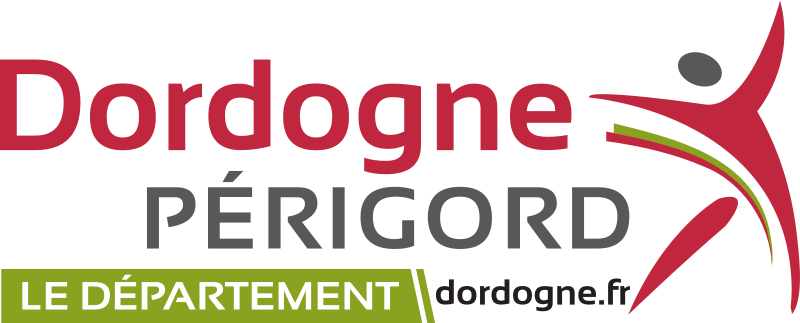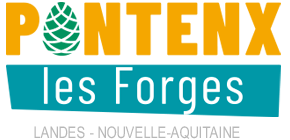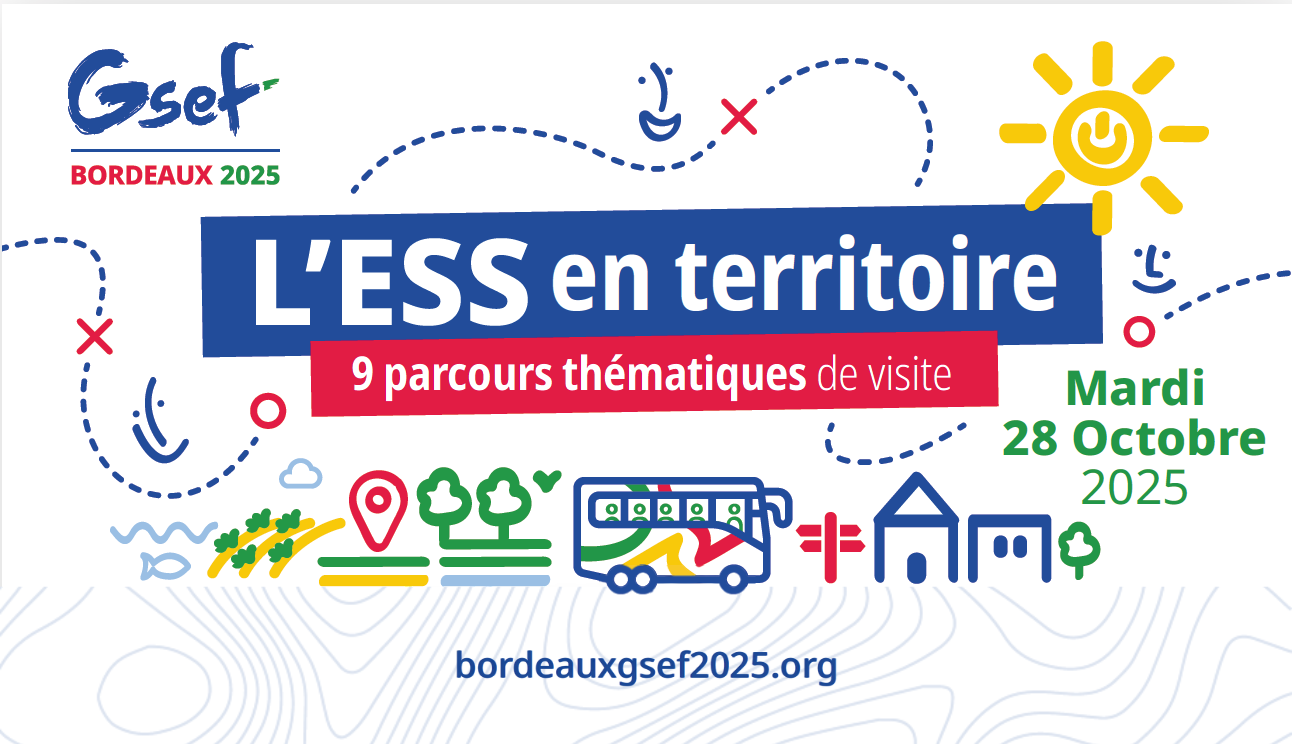
SSE in the regions
On the eve of the Bordeaux GSEF 2025 Global SSE Forum, the Région Nouvelle-Aquitaine, the Département de la Gironde and the CRESS Nouvelle-Aquitaine are offering 9 itineraries to discover the dynamics and local initiatives of the Social Solidarity Economy. Each itinerary will invite participants to immerse themselves at the heart of innovative and meaningful projects, embodying the values of cooperation, solidarity and sustainable local development.
4 routes will take place in Gironde - Médoc, Bassin d'Arcachon & Val de Leyre, Libournais and Sud-Gironde - and 5 others in neighbouring departments, in Charente, Charente-Maritime, Dordogne, Lot-et-Garonne and Landes.
Around 1,000 people have been and will be involved in these visits, including many local authorities, nearly 150 SSE players and, in Gironde, the support of the SSE Centres and the Collectif Marées. All were motivated by the desire to share the local challenges facing their area and the responses provided by those who have chosen to act for the common good.
Each route will also be an opportunity to offer a unique opportunity to discover the countryside, heritage and local specialities throughout the day.
Practical info
- The territorial pathways are reserved for participants in the Bordeaux GSEF 2025 Forum and registrations can be made online at the same time as the Forum or by returning to your personal space at a later date (the pathways are offered as an option at the end of the Forum registration).
- The course lasts one day with timetables varying according to the route (see route descriptions).
- Price: 15 euros per participant (including travel, lunch and breaks/tastings, and all activities) to be paid on registration.
- Please note: capacity limited to 45 people per tour !
- Coach travel from Bordeaux - details of the meeting point will be sent to participants a few weeks before the big day.
- Guided tours translated into English and Spanish.
- Good to know: Some of the routes include a nature walk, so don't forget to equip yourself accordingly, as specified in the relevant fact sheets.
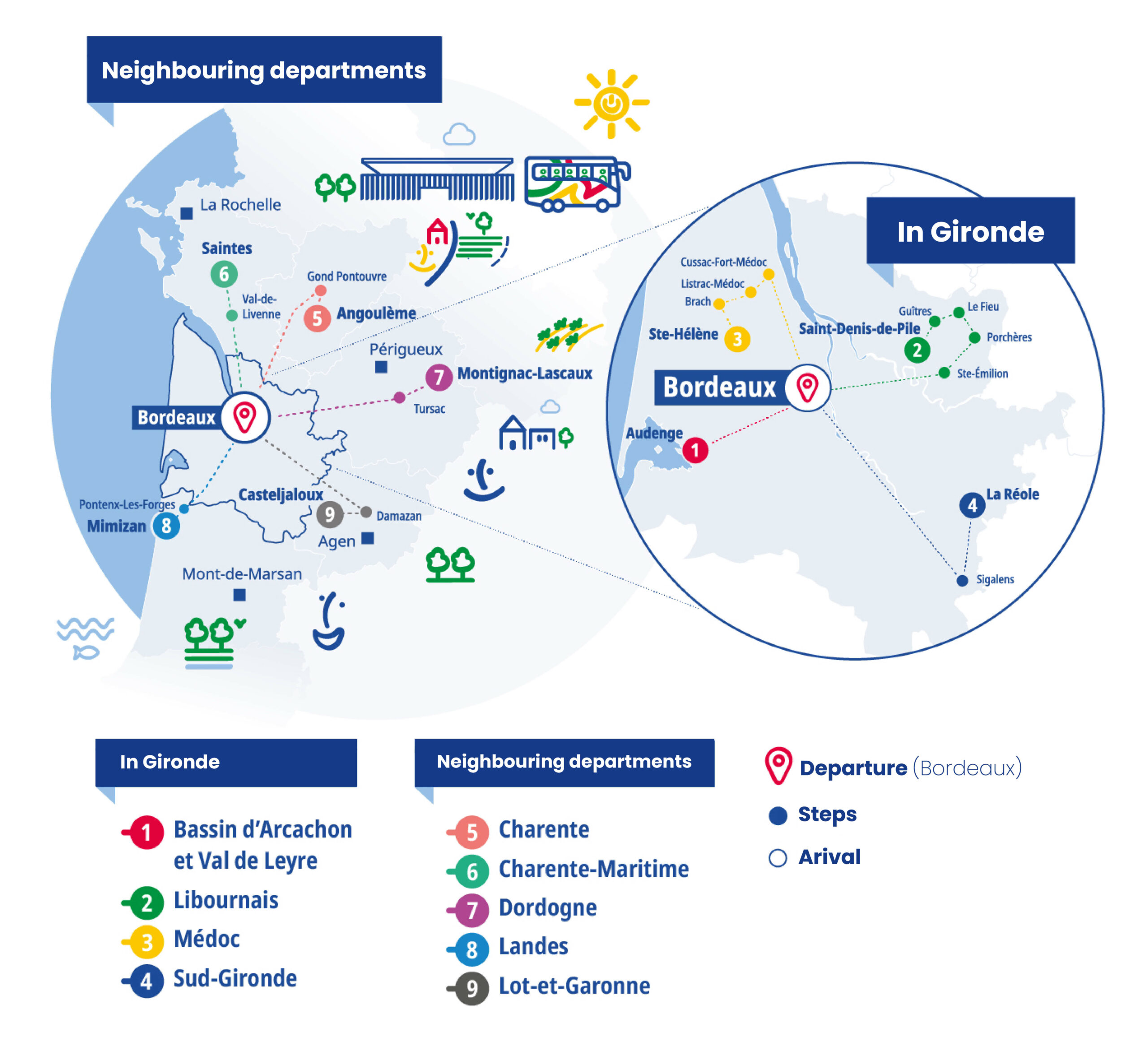
Click on image to enlarge
Pathways in Gironde
Pathway 1 – Bassin d’Arcachon & Val de Leyre
❯ Transitions
Together and differently
The aim of this pathway is to work together to come up with different ways of tackling social and environmental challenges. A day devoted to the discovery of concrete solutions devised by players to support the transition in the region and will invite participants to put themselves into action through a participatory activity. In the heart of an area where local innovation goes hand in hand with unspoilt nature, this pathway will help you appreciate the natural, cultural and gastronomic heritage of the Pays Bassin d’Arcachon & Val de Leyre.
After a welcome from the Mayor of Audenge and local councillors, we're off to La Maison des Acacias, a third-party centre run by PRiSME, which is committed to social and environmental change. Reel laboratory for environmental and social innovation, this place embodies a dynamic of ‘working together’, reinventing ways of working, creating and cooperating in the area. It's an inspiring journey to the heart of a collective space where experimentation, social links and inclusion come alive on a daily basis.
Next, heading to the Domaine de Certes et Graveyron for a nature walk. There'll be salt air, bird watching and singing, and new ideas for preserving our ecosystems. In this exceptional setting, a buffet of local produce will be served. An exhibition on birds created by APEX and a welcome by the care centre of the Ligue pour la Protection des Oiseaux (League for the Protection of Birds) will be available throughout lunch.
The afternoon will be devoted to 4 co-creation workshops, inviting participants to take part in reflection and action. Circular economy, social inclusion through environmental professions, science and culture as levers for raising awareness, and live performance workshops are just some of the approaches to which each group will contribute. To round off the day, everyone will be able to hang their next step towards transition on the Manifesto of Doing Things Differently tree.
Required: rainwear (as a precaution) and suitable footwear for walking
As well as being translated into English and Spanish, the route will also be translated into French Sign Language
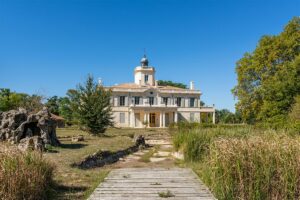
© Adobe Stock
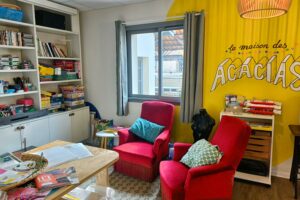
© Maison des Acacias
With…
AMAP Cœur Bassin, APEX, Atenoba, Bassin Solidarité Emploi, Bionav, Chantier Sonore, Coopérative Tiers-Lieux, Domaine de Certes et Graveyron, Echo-Mer, Fumette, Insercycles, Komono, La Cantine des Acacias, L’Atelier de Mécanique Générale Contemporaine, Les Petits Débrouillards, Ligue pour la Protection des Oiseaux, Maison des Acacias, One Ocean, Regard Sous Marin, Slikke Radio
And the support of:
Timetable :
9h / 17h30
Bus travel time :
about 1h (2h round trip)
Key words : social and environmental innovation, ecological and social transition, ecosystems, circular economy, awareness-raising, social inclusion, culture, science, third places
Tourism benefits : walks in the heart of biodiversity, unspoilt natural surroundings, local gastronomy
Pathway 2 - Libournais
❯ Rural heritage
Living well in the region
The Libournais region boasts a wealth of exceptional wine appellations known all over the world, but it is also a land of Social and Solidarity Economy. Supported by local authorities, these actors are shaping a locally-rooted development that respects the living environment and is in touch with the local population. This tour will introduce you to a wide variety of initiatives and exchanges, while immersing you in heritage and tasting.
After passing through the vineyards of Saint-Emilion and along the Moulin de Porchères, participants will be welcomed to Le Fieu by the mayor of the commune. The route will continue to the Usine Végétale, a third-party centre that has been working on the challenges of social, environmental, economic and digital transitions since 2018. Hosted by the Communauté d'agglomération du Libournais (la Cali) and the site's stakeholders, it will be time to discover the site's activities through 3 workshops on eco-construction, living gardening and the circular economy. An opportunity to learn about sustainable techniques that combine knowledge from the past with needs for the future, to explore agroecological practices in the service of food resilience, and to see how waste can be reused. Local residents will share inspiring testimonials on the SSE, collected by Radio Label Verte.
Then it's on to Saint-Denis-de-Pile, via Guîtres, to meet the mayor. Lunch and a tasting of local specialities will be served in the gardens of the Médiathèque BOMA. The tour will continue through the streets of the town, where you will be able to discover local initiatives. An exhibition will reveal the local historical and cultural heritage, while a screening at the Accordeur, an association dedicated to contemporary music, will present various individual and collective works. On the banks of the Isle, the natural heritage will be revealed with an immersion in the Parlement de l'Isle thanks to Collectif 3/3. Finally, it's time to head home after a visit to the local recycling centre.
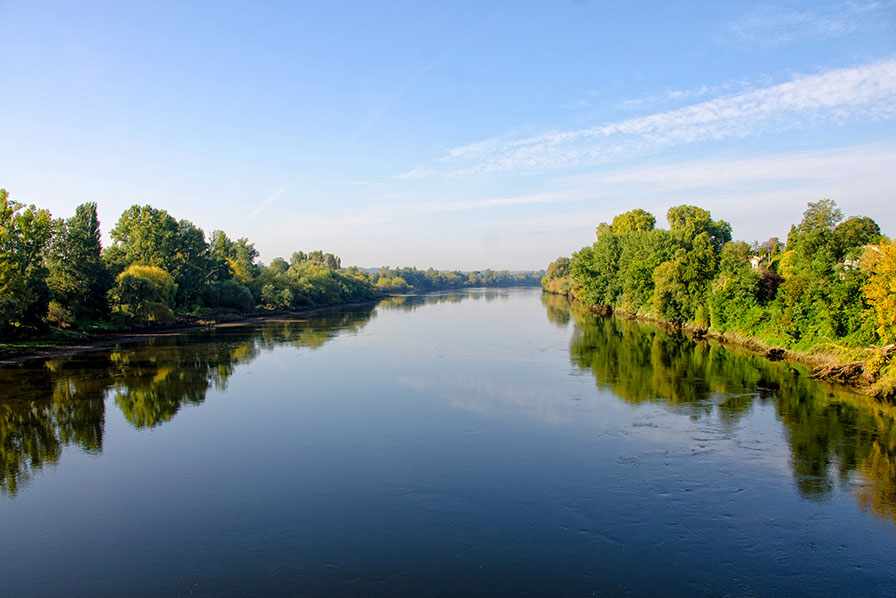
© Adobe Stock
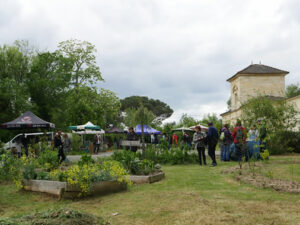
© Usine Végétale 209
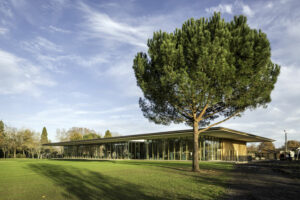
© Ville de Saint-Denis-de-Pile
With…
ADAPEI 33, AFEPT (trainees at the École de la 2th chance), Arrêt Minute (Maison Graziana), Cantine 209, Cargo 209, Castilab, Centre LGBT rural Nord Gironde, Collectif 3/3, Court aux Trousses, De la Tête au Toit, L’Accordeur, La ferme deux bouts, Le Jardin Vivant, Liblab, Médiathèque BOMA, Nouvel’R, Office de Tourisme du Libournais, Portrait de famille, Radio Label Verte, Recyclerie de Saint-Denis-de-Pile, Usine 209
And the support of:
Timetable :
8h45 / 17h30
Bus travel time :
about 1h (2h round trip)
Key words : cooperation, local dynamics, participation, culture, eco-building, agroecology, food resilience, circular economy, heritage preservation, common good
Tourism benefits : historical and cultural heritage, walking tours, scenery, local produce tasting
Pathway 3 – Médoc
❯ Commons and CTR
Land of the commons
The Médoc is a land of heritage, where tradition, know-how and nature coexist. This tour will focus on the transformation of heritage into a common heritage, and on responsible entrepreneurship in the region. And of course, the pleasures of the table will not be forgotten, with a wine tasting and an original lunch.
Following the route of the Bordeaux châteaux, the first stop at Cussac-Fort-Médoc will be to admire the panoramic view over the Gironde estuary. A local councillor will welcome you to Fort Vauban, where he or she will present the community projects initiated by the town council with its residents, such as the municipal market-garden scheme and the project to restore the bakery/oven. Then off to Listrac-Médoc, au tiers-lieu artistique et artisanal, né de la volonté de protéger le savoir-faire patrimonial, de l’entreprise Les Grès Médocains, the last remaining brickworks in the area. It's here that a village of SSE players from the Médoc will come to life for a time of sharing. It's also an opportunity to find out more about the area at the heart of which all these initiatives are being developed, thanks to the exhibition ‘Regard croisé sur l'Estuaire’ (Crossed Views of the Estuary) and the contribution of the Parc Naturel Régional.
After an on-site lunch showcasing local produce and a wine tasting session, it's off to Sainte-Hélène. On its premises, Adam, a wood packaging manufacturer with the Entreprise du Patrimoine Vivant (Living Heritage Company) label, will be presenting its approach to corporate territorial responsibility, where social performance and sustainable development go hand in hand with economic competitiveness. ESSpairs, a local support scheme for collective and individual projects in the social economy, supported by Adam supported by Adam through its F.A.I.R.E endowment fund, will also be highlighted.
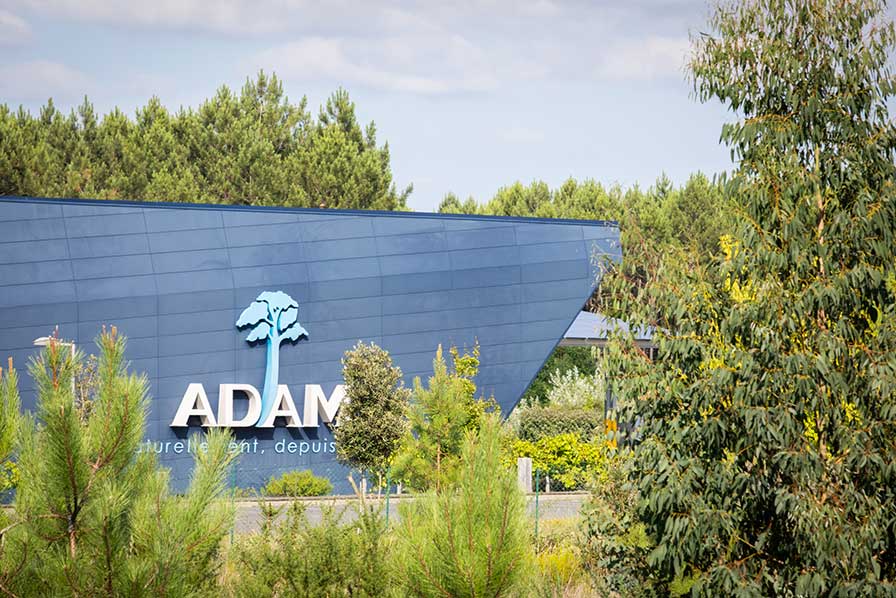
© Adam
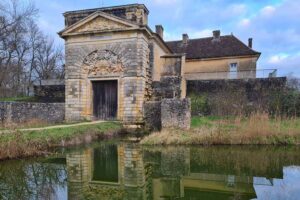
© Médoc Tiers Lieux

© Grès Médocains
With…
APADEV et le fonds de dotation VALOREM, Cabinet de curiosités (Adam, CPIE, Médoc Tiers Lieux, Parc Naturel Régional Médoc), EH!CO, ESSpairs, Grès Médocains, Isolat, La Briqueterie, La cuisine de L, Librairie des transitions et la Cocotte, L’Escale et la recyclerie
And the support of:
Timetable :
8h45 / 18h
Bus travel time :
about 1h30 (3h round trip)
Key words : crafts, local know-how, heritage, shared resources, cooperation, corporate territorial responsibility
Tourism benefits : Châteaux Route, Fort Médoc, Gironde estuary, wine tasting
Pathway 4 – Sud-Gironde
❯ Revitalisation and resilience
Meeting the challenges of rural life
This pathway illustrates how cooperatives, citizens and food dynamics, as well as social innovation can revitalise rural areas. Not forgetting a taste of the historical, landscape and culinary assets of this endearing land of the Sud-Gironde.
The day will begin in Sigalens with a hearty breakfast and a visit to the bakery run by the association La Sigale & le Fournil. Through the testimonies of the mayor of Sigalens and the various speakers, the focus will be on sustainable food and citizen participation as local levers. This will be an opportunity to learn more about various local initiatives, such as the Social Food Security experiment, the participatory grocery shop, La Boussole third-location centre and the bakeries involved in the SSE.
The tour then moves on to La Réole where the Mayor will be on hand to welcome the group, followed by a 100% plant-based and local lunch prepared by La Bulle association and served at the town hall. The tour will continue through the streets of this fortified medieval town on the banks of the Garonne, with stops at the cultural venue La Petite Populaire and the local microbrewery. Finally, a meeting with local SSE players will provide an opportunity to discuss the challenges being met by Social Innovation in a spirit of participation and care: how the area is coping with its ageing population, particularly in terms of housing, and how inclusive and resilient SSE dynamics are being developed to meet the needs of all, including the most vulnerable, with a view to sustainability.
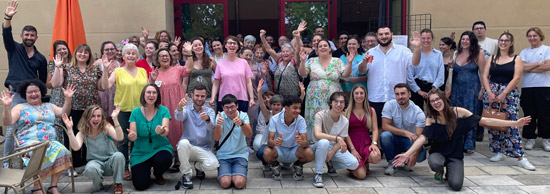
© La Sigale et le Fournil
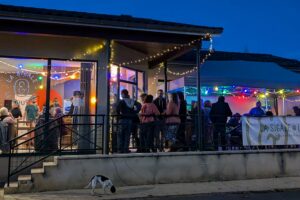
© La Sigale et le Fournil
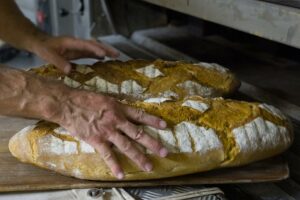
© Christophe Goussard
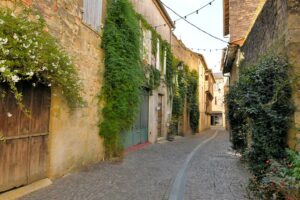
© Adobe stock
With…
APEFEM, Association Agroécologique Carbouey, Chapeau et Bottes, Habitats des Possibles, La Boussole, La Bulle, La Collective, La NOMALI & CO conserverie du Sud-Gironde, La Petite Populaire, La Sigale & le Fournil, Les Amis de la Coopé, Osons les Derniers jours Heureux, Panuz, Solid’Avenir…
And the support of:
Timetable :
9h / 18h
Bus travel time :
about 1h (2h round trip)
Key words : resilience, citizen participation, social innovation, sustainable food, care, culture
Tourism benefits : softness of the landscape, the town of La Réole with its Town of Art and History label, tasting of local produce
Pathways in neighbouring departments
Pathway 5 – Charente
❯ Circular economy
Between transition and circular economy
This pathway highlights the virtues of the circular economy. It showcases the initiatives of people committed to giving objects a second life and to the structuring of local re-use sectors, particularly in the building and textile sectors, thanks to collaborative initiatives. And because Angoulême, designated a UNESCO Creative City in 2019, is also the world capital of the comic strip, a visit to the city's artistic and cultural universe is a must!
The day will start at Plan B in Gond-Pontouvre, a new space dedicated to reuse and raising public awareness of waste sorting and recovery in the Angoulême conurbation. The Agglomération du Grand Angoulême will provide a gourmet welcome for participants. A visit to the site will provide an opportunity to discover the activities of SSE players taking up the challenges of the circular economy. Workshops will also be offered by the resident associations at Plan B. Based on the principle that ‘the best waste is the waste we don't produce’, the focus will be on the recycling and reconditioning of various materials and everyday objects. The next event will take place at the Charente Departmental Council, where participants will share a tasty lunch prepared by a caterer committed to the professional integration of people far from employment, with a tasting of local specialities.
The tour will continue with a visit to La Bascule, the Charente's first platform for the reuse of building materials, which is also a back-to-work workshop. This new player provides an appropriate response to the region's professional, social and environmental needs. To round off the day and before heading back to Bordeaux, participants will be invited to explore the treasures of the Cité internationale de la bande dessinée et de l’image and the Musée de la BD, to discover the initiatives undertaken by this cultural player in the field of transitions.
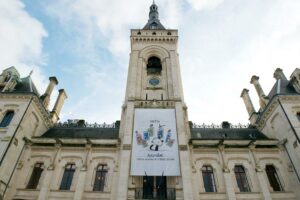
© Région Nouvelle-Aquitaine / Françoise Roch
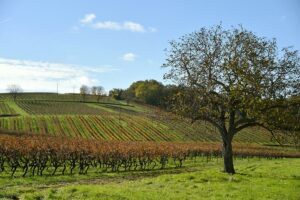
© Région Nouvelle-Aquitaine / Françoise Roch
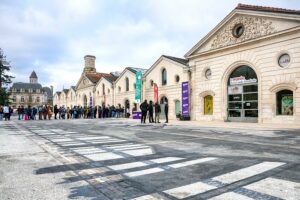
© Région Nouvelle-Aquitaine/ Yannick Pirot
With…
Atelier 9 (ARU), CADRESS, CEDIF, CIDIL, La Bascule, Musée de la BD, Mycelium Charente, Plan B (Cyclofficine, Envie Charente, Laplla.Net, Recyclerie Avril), Tisséna
And the support of:
Timetable :
8h30 / 19h
Bus travel time :
about 1h30 (3h round trip)
Key words : circular economy, recycling, reconditioning, reuse, construction, work integration, textiles
Tourism benefits : comic strips, culture, local gastronomy
Pathway 6 – Charente-Maritime
❯ Cooperative models and local development
In the footsteps of cooperative models
This pathway will look at how cooperative models can promote social cohesion, inclusion and integration, and how local authorities can use the SSE as a basis for economic and social development in their area. It's also an opportunity to get to know the beautiful town of Saintes, with its exceptional and vibrant heritage.
The day will begin in Saintes at the headquarters of Coop Atlantique, a consumer cooperative present in 11 départements, which will introduce the commitment and impact of the cooperative model on the development of local SSE projects. The vice-president of Saintes Grandes Rives, L’Agglo will present the local authority's social and solidarity economy strategy. The ADEFIP association will be demonstrating the value of participatory financing in the creation and development of local projects, using the example of the dedicated " J’adopte un projet " platform. Next up is Dans l’œil du Silo, a former grain silo that has been converted into a multicultural alternative space that fosters social cohesion. Here, Côté Coulisses and CAE Oriú will be talking about their support for cultural players. La Douka, an inclusive caterer, will be serving up a lunch of local and international flavours.
In the afternoon, a tour of the heritage of Saintes will include the garden and remains of the Arena, stone curiosities along the green line, the La Belle Étoile garden and a presentation of the work carried out by the Le Sas's integration project. The walk will end at the Basilique Saint-Eutrope. On the way back, stop off at the Vignerons de Tutiac cooperative winery, which brings together 500 cooperative winegrowers north of the Gironde estuary, for a tour and to taste the wines produced on the estate.
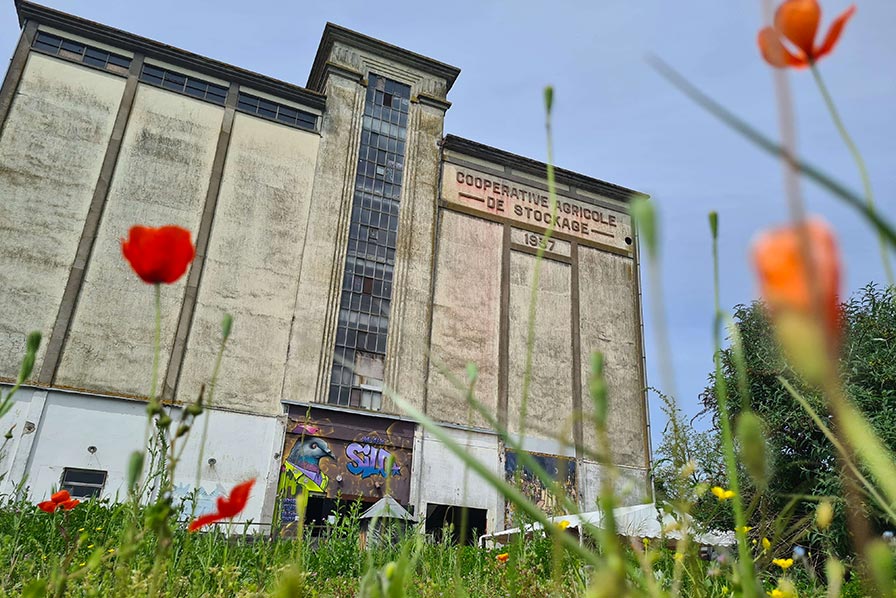
© Dans l’œil du Silo
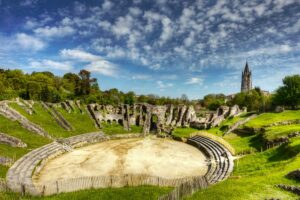
© Adobe Stock
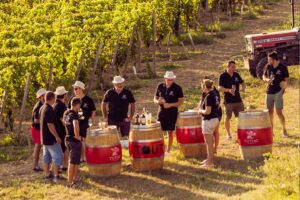
© Studio Tonelli
With…
ADEFIP, Coop Atlantique, Coopération agricole Nouvelle-Aquitaine, Coopérative d’activités et d’emploi Oriú, Coopérative Les Vignerons de Tutiac, Côté Coulisses, Dans l’œil du Silo, La Belle Étoile, La Douka, Le Sas, MétamorphOse
And the support of:
Timetable :
8h30 / 19h
Bus travel time :
about 1h30 (3h round trip)
Key words : cooperatives, consumption, social links, culture and art, inclusion, integration, support
Tourism benefits : historical heritage with Roman ruins and Romanesque jewels, gardens, vineyards
Pathway 7 – Dordogne
❯ Relocating and structuring SSE-inspired industries
Relocating and structuring industries
This pathway highlights the way in which local initiatives can structure and give lasting impetus to crafts and culture, inseparable from the region's identity. It's also an opportunity to discover the art of prehistory at Lascaux, the emblem of the Périgord Noir, and to savour the flavours of the region.
In the commune of Tursac, the day will begin with a visit to Au Coin des Scieurs, a sawmill run by an association that is working to develop a local wood and forestry industry based on solidarity. The aim is to promote gentle, respectful management of the forest heritage of the Périgord region, while consolidating local expertise. Workshops will be held throughout the morning with the association's SSE partners to help visitors discover different initiatives for reusing wood. The programme includes a forest marking workshop, a woodcutting demonstration, a green wood carving workshop, bread baking in a traditional wood oven and many other activities involving wood and eco-construction. After this immersive experience, a country-style barbecue in the heart of the countryside will celebrate the gastronomy of the Périgord region.
In the afternoon, off to Montignac-Lascaux for an interactive tour of Lascaux IV, the International Centre of Cave Art. It's a chance to immerse yourself in the prehistoric history of the region and marvel at the complete replica of the Lascaux cave. The day will end with a presentation of the social project, Fonds Lascaux, set up by the site manager, Semitour. This endowment fund develops solidarity actions in favour of people who are far from culture, thus facilitating access to this heritage treasure.
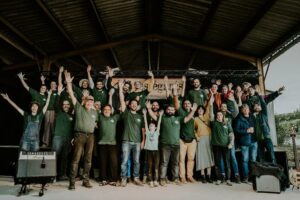
© Alexandra Photographe des Amoureux
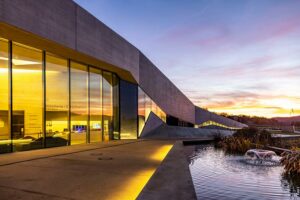
© Déclic & Décolle
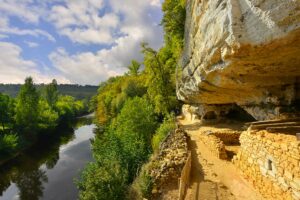
© Adobe Stock
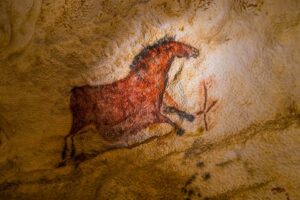
© Dan Courtice
With…
Au Coin des Scieurs, Cœur de Forêt, Coop&BAT, La Brigad’Ali, La Gare Mondiale, Les Boiseaux, Semitour, Semiper
And the support of:
Timetable :
8h30 / 19h
Bus travel time :
about 2h (4h round trip)
Key words : wood and forestry, reuse, sustainable construction, traditional skills, social projects, culture and heritage
Tourism benefits : landscapes, the Lascaux cave, cave history, country-style barbecue with local produce
Pathway 8 – Landes
❯ Social innovation and food
Accelerating social innovations
This pathway illustrates how the Social and Solidarity Economy can energise a rural area through social innovation projects, particularly in the fields of work integration and food. A range of local initiatives will showcase practical solutions to the challenges of employment, accommodation, food, mobility and sustainability. It's also an opportunity to take a fresh look at the Landes forest and the coastal beach landscape.
The day will begin in Pontenx-les-Forges, in the heart of the Tastot airial, in a third-party food centre run by the association La Smalah which is working to build resilience in the region through training in peasant farming and getting young people back into work. Emphasis will be placed on professional integration, solidarity mobility and re-employment, through the presentation of the local experimentation of the Territoire Zéro Chômeur Longue Durée (Zero Long-Term Unemployed Territory) project by EBE SEVE 40. The day will continue at Mimizan-plage, at the Hélistation, a former first-aid post that has been converted into a place to live and provide accommodation. Designed to accommodate seasonal workers and young people in employment or training, this project meets a strong need for accessible accommodation in seaside resorts. This event will provide an opportunity to discover initiatives to promote local and sustainable food, as well as local public policies supported by the Landes County Council and the Nouvelle-Aquitaine Region. On this occasion, a partnership agreement will be signed between the two local authorities, before a tasting of local produce for lunch.
The next stop is the Grenier de Mézos, a recycling centre run by an association that fights against waste and exclusion. The Coopérative Jeunesse de Services will also be presenting its work. This initiative, run by PLOUCS association and the cooperative Co-actions, has enabled nearly a hundred young people to experiment with collective and cooperative entrepreneurship. The day will be enriched by testimonies from elected representatives and players in the SSE sector.
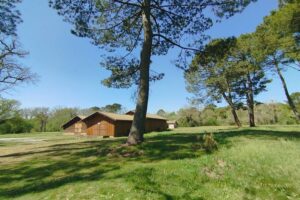
© Georges-Henri Abtour et Région Nouvelle-Aquitaine
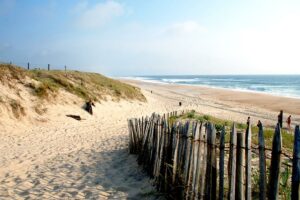
© Adobe Stock
With…
EBE SEVE 40, Chanvre des Landes, Co-actions, Éole, Grenier de Mézos, Hélistation, La Smalah, PLOUCS
And the support of:
Timetable :
9h / 18h
Bus travel time :
about 1h30 (3h round trip)
Key words : professional integration, training, employment, circular economy, housing, entrepreneurship, agriculture, food, youth
Tourism benefits : pine forests, Landes airial, ocean, tasting of local products
Pathway 9 – Lot-et-Garonne
❯ Regional attractiveness and tourism
Cooperating for transitions
Lot-et-Garonne is a land of confluence, imbued with a rural and river identity. This pathway highlights various examples of local cooperation to protect the environment, particularly in terms of the circular economy, but also to develop and enhance the attractiveness of a rural area: tourism, local food, youth initiatives. And along the way, we'll be discovering some of the department's typical landscapes and towns.
The day will begin in Damazan at the Departmental waste processing association, ValOrizon, which will open its doors to show how to create wealth from what is known as ‘waste’. The site's president will present the missions and operations of the ecopark, which includes an Economic Cooperation Cluster, the Village du réemploi (Reuse Village) and a Cluster Économie circulaire et valorisation des matériaux recyclables. The tour of the site will provide an opportunity to talk to local SSE players working to promote reuse, and to find out what the Maison de l'Économie Circulaire and the sorting centre are doing. The discussions will illustrate the virtuous links between innovation, recycling, solidarity and environmental responsibility.
The 100% local lunch will take place in the heart of an oak forest, at La Taillade, an inclusive and educational home. This will be followed by a stroll around the site to meet local SSE players in three themed sequences. The first will be devoted to new visions of tourism: solidarity and ecology. The sequence on agriculture and food will look at local circuits, the fight against waste and solidarity. Finally, in the section on young people, you can find out more about how the SSE is being introduced into schools, training courses and awareness-raising.
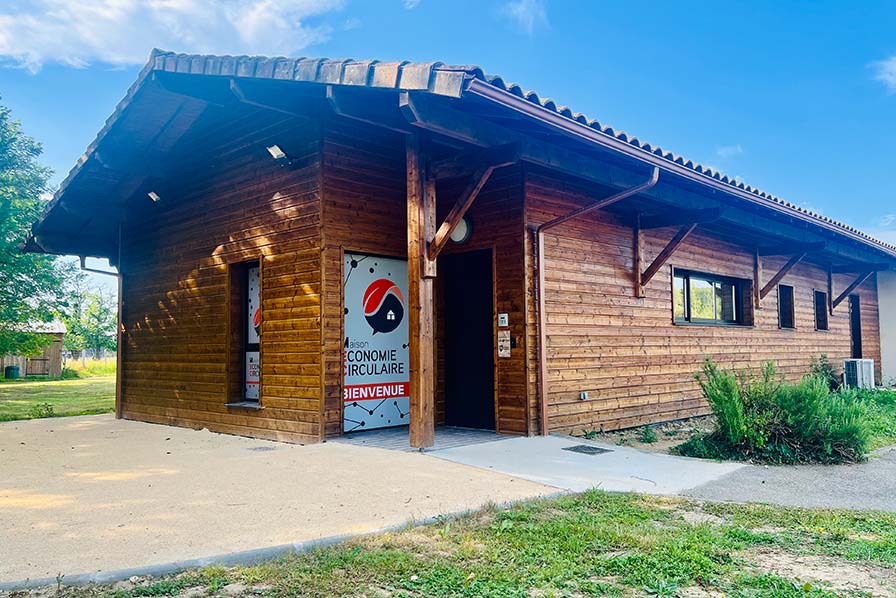
© ValOrizon
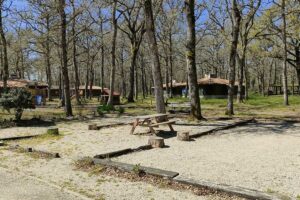
© La Taillade
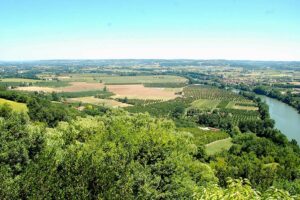
© Adobe Stock
With…
Agrocampus, Archipel 47 (Ateliers de Boussères, Belvédère, Berceau des Nymphéas, Château & Fabriques de Buzet, La Taillade, La Vieille École, Le Grand Bain, Les Petits Grains, Maison Forte, Tera), Cluster Économie circulaire et valorisation des matériaux recyclables, Emmaüs le Maquis, Esper, Hang’art, La Ferme des producteurs, ValOrizon PTCE Village du Réemploi, Syndicat IAE (AFDAS, Archi’Mede, Envi +, Régie Vallée du Lot)
And the support of:

Timetable :
9h / 18h
Bus travel time :
about 1h (2h round trip)
Key words : circular economy, reuse, innovation, solidarity, environmental responsibility, recycling, agriculture, tourism, youth
Tourism benefits : oak forest, medieval town and bastide, tasting of local products



